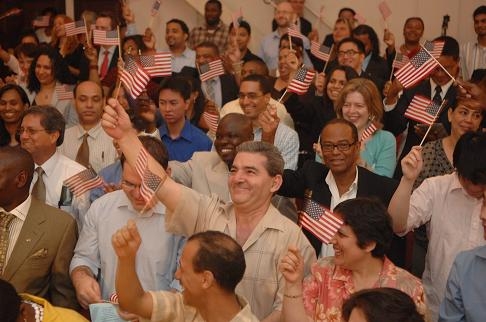Today — September 17th — is National Citizenship Day. Amidst anti-immigrant legislation like SB 1070, anti-Muslim incidents and the New York Mosque controversy (which some feel is being exploited by Republicans to curry votes in the upcoming elections), race-based violence against immigrants, and the dismal failure of Obama and the rest of the Dems to deliver on comprehensive immigration reform -- let’s take some time to celebrate the positive and crucial contributions immigrants have made to every aspect of American society, and the aspects of immigrant integration that we can impact now.
While legalization of undocumented immigrants is unlikely to happen this year, we can still help the estimated 8.2 million LPRS (legal permanent residents) become citizens. While LPRs are eligible to naturalize after five years of living in the US, the average time people wait until applying is seven to twelve years, which delays the full rights they could be gaining under the Constitution.
When one becomes a citizen, they attain rights such as protection against deportation, reunification and residency assistance with family members abroad, and — incredibly important for the upcoming midterm elections -- the right to vote. Research shows that naturalized immigrants — when registered — vote at higher rates than the native-born. And APIAs tend to vote left (an 11-state exit poll of Asian American voters found that, collectively, they voted for Obama by more than a three to one margin, and 58% were registered Democrats; Vietnamese American voters were the only Asian American group to favor McCain), which means less right-wingers in power positions and less racist, anti-immigrant legislation in the long run. But our folks need even more outreach and assistance to successfully register and turn out to the polls.
The federal government did not always promote immigrant naturalization, upholding numerous exclusionary restrictions based on race and sex. Up to the repeal of the Chinese exclusion laws in 1943, Chinese Americans were not eligible to naturalize; 1946 for Filipinos and Indian Americans with the signing of the Luce-Celler Act. Immigrant women could not apply for citizenship independent of their husbands, becoming citizens only when their spouses naturalized. Luckily, today US Citizenship and Immigration Services (USCIS) actively partners with community groups to outreach to immigrant populations, and provides free naturalization resources and tools.
So whether it’s encouraging someone in your family who may be eligible to naturalize, or volunteering at an ESL or citizenship prep class, there's actions we can take to help more immigrants realize the American dream, (especially important as state budgets for ESL classes are being slashed). For more info and resources for english and naturalization learners, teachers, and organizations, go here. Happy Citizenship Day!











Comments